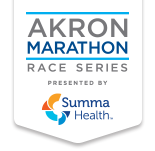Race is one of only 16 events in the country to earn gold distinction
EUGENE, Ore. (Nov. 25, 2014) — The Akron Marathon is one of 16 events across the country to earn Gold Level Certification from the Council for Responsible Sport, making it the first ever Ohio-based event to do so. The marathon targeted goals focused on planning, measurement and continuous improvement. This year, organizers elaborated on sustainability plans earning credit in five categories spanning procurement and resource management to access, equity and community legacy.
Held September 27, 2014 the marathon undertook several dozen social and environmental efforts, including the update of a comprehensive sustainability plan, implementing ‘green’ purchasing guidelines for event vendors, eliminating bottled water from the race course, donating leftover food and clothing to local non-profit partners, calculating a complete event greenhouse gas emissions report and diverting over 80 percent of waste generated by the event from the landfill.
“At the Akron Marathon, we pride ourselves in providing a world-class experience for our runners and our community,” said Akron Marathon Executive Director Anne Bitong. “We take our environment and sustainable efforts very seriously and are thrilled to be the first race in the state of Ohio and one of 16 in the country to achieve Gold Level certification by the Council for Responsible Sport. We share this achievement with our many partners including the City of Akron, ReWorks, and Keep Akron Beautiful as well as with all of our runners and volunteers that assisted us in our efforts.”
The Council for Responsible Sport works with third-party evaluators to assess event efforts.
“The Akron Marathon demonstrated that an event can do it all – provide a technically flawless race that wows athletes and gives all their stakeholders multiple reasons to love the event,” said Akron evaluator Joanne Gorksi. “They minimized the impact on the environment and diverted over 80% of event waste from being land-filled, showcased and helped multiple local non-profits, responsibly sourced food locally, and chose event premiums that had sustainable components. All these factors, and more, combined to generate over $6.3 million in increased economic activity and draw 14,675 race participants. Akron is a success story in how to produce and deliver a responsible sporting event that benefits everyone including the local economy.”
About the Council for Responsible Sport
Our vision is a world where responsibly produced sports events are the norm. Our mission is to provide objective, independent verification of the socially and environmentally responsible work event organizers are doing, and to actively support event organizers who strive to make a difference in their communities. The current version of the Council’s Certification standards (v.4.1) was developed by an outside working group of both sustainability and sport industry experts, reviewed by a wide range of stakeholders throughout 2013 and implemented in January 2014. www.CouncilforResponsibleSport.org
